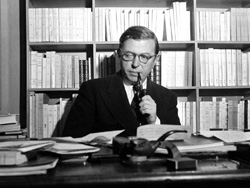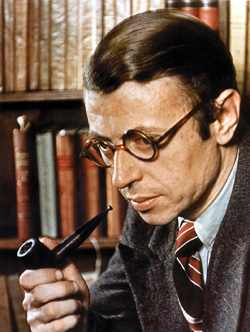| Profiles > Philosophy > Jean Paul Sartre | |||||||||||||||||
| Jean Paul Sartre | |||||||||||||||||
|
|||||||||||||||||
|
While teaching at Le Havre, Sartre received a stipend from the Institut Français, allowing him to study in Berlin with Husserl and Martin Heidegger in 1932. He broke from his teaching a second time, when he was drafted in 1939 to serve in World War II. In 1940, he was captured and held prisoner for a year, and upon his release he began teaching in Neuilly, France, and later in Paris, where he was involved in the French Resistance. He and Merleau-Ponty founded a resistance group of intellectuals called Socialisme et Liberté. The German authorities, unaware of his subversive and underground activities, allowed the production of Sarte's anti-authoritarian play The Flies (1943) and the publication of his major philosophic work “Being and Nothingness” (1943).In 1945, he quit teaching and (with de Beauvoir) founded Les Temps Modernes, a political and literary magazine (Sartre eventually playing the editor-in-chief). After the War, Sartre was an active independent socialist, while being critical of the USSR and the US for the cold war. He would soon align himself with the Soviet cause, though he remained critical of their policies. His hopes for communism were ended upon the entry of Soviet tanks into Budapest in 1956. | ||||||||||||||||
| He dedicated a long article in Les Temps Modernes, "Le Fantôme de Staline", condemning both the Soviet intervention and the submission of the French Communist Party to the interests of Moscow. His ongoing critiques of the communists led to the formation of "Sartrian Socialism", which he expressed in the publication of his major work Critique of Dialectical Reason (1960). He was an outgoing supporter of the student movement in France of May '68, rising to unusual heights in his accusation of the Communist Party as having betrayed the May revolution. He remained politically involved by editing and supervising the publication of various Leftist publications. Proclaiming, "Commitment is an act, not a word," Sartre often participated in street riots, in the sale of left-wing literature, and in other activities to promote the revolution. | |||||||||||||||||
|
|||||||||||||||||
| Sartre's ontology is explained in his philosophical masterpiece "Being and Nothingness", where he defines two types of reality that lie beyond our conscious experience - the being of the object of consciousness and that of consciousness itself. The object of consciousness exists as "in-itself", i.e., in an independent and non-relational way. However, consciousness is always consciousness "of something", so it is defined in relation to something else, and it is not possible to grasp it within a conscious experience - it exists as "for-itself". An essential feature of consciousness is its negative power through which we can experience "nothingness". This power is also at work within the self, where it creates an intrinsic lack of self-identity. So the unity of the self is understood as a task for itself rather than one that is given.Sartre shifted the locus of his existentialist thought in Critique de la Raison Dialectique in 1960 (Critique of Dialectical Reason) to Marxist social determinism, arguing that the influence of modern society was so strong it produced a serialization, or a loss of self. To regain individual freedom from such forces in society, one must seek group revolutionary action. After close examination, he discovered that the Marxist dialectic did not exist in the Soviet Union, and that it could not within the persecution of individual freedom. He did feel Marxism was too rigid and “universalist” to deal with the ever-changing situations that produce demands particular to existential, concrete circumstances. Such demands are also characterized by “historical materialism”, though they differ for each collectivity, as well as for each individual and their personal freedom. Some philosophers argue that Sartre's thought is contradictory. Specifically, they claim that Sartre makes metaphysical arguments despite his claim that his philosophical views ignore metaphysics. Herbert Marcuse criticized “Being and Nothingness” for projecting anxiety and meaninglessness onto the nature of existence itself—"Insofar as Existentialism is a philosophical doctrine, it remains an idealistic doctrine: it hypostatizes specific historical conditions of human existence into ontological and metaphysical characteristics. Existentialism thus becomes part of the very ideology that it attacks, and its radicalism is illusory”. Philosophers Richard Wollheim and Thomas Baldwin have argued that Sartre's attempt to show that Sigmund Freud's theory of the unconscious is mistaken was based on a misinterpretation of Freud. | |||||||||||||||||
| Sartre was offered the Nobel Prize for literature in 1964 for his autobiography “Words”, though he subsequently rejected the award based on his own notions of his integrity as a writer. His own philosophy bears the influences of the phenomenology of Edmund Husserl, the metaphysics of G.W.F. Hegel and Martin Heidegger, and the political and social theories of Karl Marx into his own brand of existentialism. The existentialist humanism, which Sartre championed in his widely read essay L'Existentialisme est un humanisme (Existentialism is a Humanism, 1946), also appears in the series of novels, Les Chemins de la Liberté (The Roads to Freedom, 1945–49). He wrote extensive literary criticism and his other publications include Baudelaire (1947), and a somewhat ethical study on the French writer and poet Jean Genet entitled Saint Genet, Actor and Martyr (1952). From 1960 to 1971 Sartre worked on a four-volume biography on Gustave Flaubert called L'Idiot de la Famille, using Freudian and Marxist interpretations from his other philosophical work. Flaubert had been a childhood preoccupation for Sartre, demonstrating Flaubert to be the person his family and society had determined him to be. | |||||||||||||||||
|
|||||||||||||||||
| "Man can will nothing unless he has first understood that he must count no one but himself; that he is alone, abandoned on earth in the midst of his infinite responsibilities, without help, with no other aim than the one he sets himself, with no other destiny than the one he forges for himself on this earth." (from L'Être et le Néant / Being and Nothingness, 1943) | |||||||||||||||||
|
Credits
http://en.wikipedia.org/wiki/Jean-Paul_Sartre#By_Sartre http://www.egs.edu/library/jean-paul-sartre/biography http://www.iep.utm.edu/sartre-ex http://www.sparknotes.com/philosophy/sartre/context.html http://plato.stanford.edu/entries/sartre |
|||||||||||||||||










